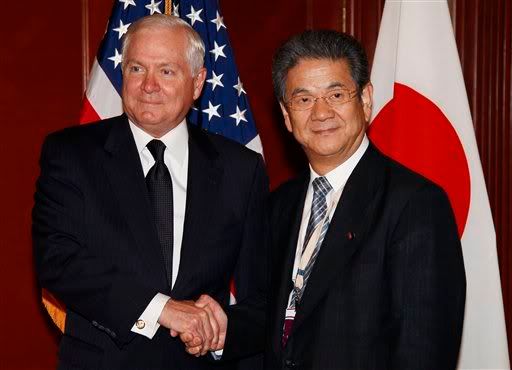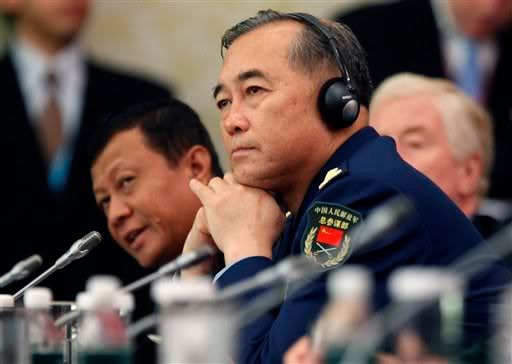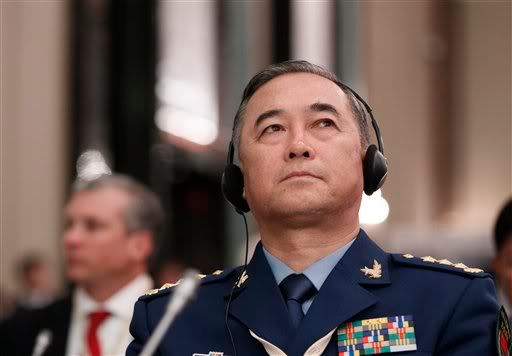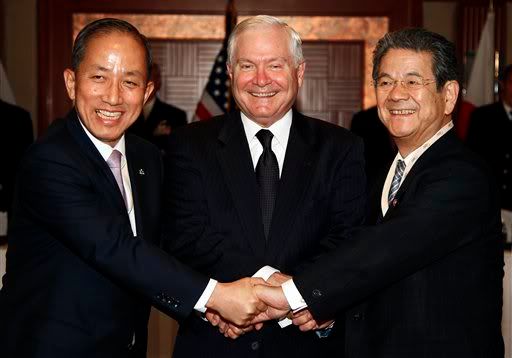
Defense Secretary Robert M. Gates, left, shakes hands Japan's Minister of Defense, Toshimi Kitazawa, during the Shangri-La Dialogue's Asia Security Summit in Singapore, Saturday, June 5, 2010.

The Chinese military's deputy chief of staff, General Ma Xiaotian, listens as Defense Secretary Robert M. Gates delivers remarks during the first plenary session at the Shangri-La Dialogue's Asia Security Summit in Singapore, Saturday, June 5, 2010.
U.S. Defense Secretary Robert Gates challenged China to deal realistically with the short-term question of how to respond to an antagonistic North Korea and the longer-term issue of whether Beijing's expanding military can establish more durable ties with the U.S.
Asian nations cannot stand by in the face of North Korea's alleged sinking of a South Korean warship, Gates said during an international security summit Saturday that was dominated by questions about the North.
"To do nothing would set the wrong precedent," Gates said.

The Chinese military's deputy chief of staff, General Ma Xiaotian, listens to a translation with headphone as Defense Secretary Robert M. Gates in introduced to deliver remarks during the first plenary session at the Shangri-La Dialogue's Asia Security Summit in Singapore, Saturday, June 5, 2010.
The latest crisis with North Korea points out the limited options to deter further attacks or dismantle its nascent nuclear weapons program. The United States and China were part of a diplomatic effort to buy out the North's nuclear program that fell apart two years ago.
In an interview Saturday, Gates mused that North Korea seems immune to many of the traditional levers of international pressure, such as ostracization.
"How do you gain purchase with a regime that doesn't seem to care what happens to it?" Gates said in the BBC interview.
"As long as the regime doesn't care what the outside world thinks of it, as long as it doesn't care about the well-being of its people, there's not a lot you can do about it, to be quite frank, unless you're willing at some point to use military force. And nobody wants to do that."
The U.S. and South Korea want China to back a new international condemnation or punishment of the North.
At the Shangri-La Dialogue conference in Singapore, Gates joined South Korea in trying to marshal world support for the conclusion that North Korea was to blame for the sinking and should be held to account. South Korean officials handed out glossy pamphlets containing the results of an international investigation that found North Korea blew the warship Cheonan apart with a torpedo.
China, the North's closest ally, has not assigned blame for the sinking in March that killed 46 South Korean sailors.
Gates met several times with South Korean officials over two days here, including a symbolic three-way discussion Saturday with officials from South Korea and Japan. Washington is pledged to defend both nations as a legacy of U.S. wars in the Pacific.
Gates made the point during that session that the three nations "have to have a united front to deter further provocation," Pentagon press secretary Geoff Morrell said afterward.
South Korea referred the sinking to the U.N. Security Council on Friday. The council has the power to impose penalties. China is one of five veto-holding members of the council.
China is the communist North's largest patron, giving it economic and political pull over an otherwise reclusive government. The U.S. and South Korea want China to use that clout to rein in the North Koreans.
At the security summit, Gates did not mention China's financial and diplomatic support for North Korea but said "the nations of this region share the task of addressing these dangerous provocations."
In a tense exchange following his address to the conference, Gates dismissed suggestions by a Chinese general that Washington was being hypocritical in criticizing North Korea but not Israel for its commando raid on an aid flotilla in the Mediterranean Sea this past week.
"There is a wide gap in the U.S. attitude and policy to the two instances," said Maj. Gen. Zhu Chenghu of China's National Defense University.
Gates said the attack on the warship was a surprise operation conducted "without any warning." Israel had issued several warnings to the flotilla not to enter its territorial waters, he said.
"I won't make judgment on responsibility or fault" about that incident, Gates said, adding that he favors an international investigation to determine responsibility.
The general also took on Gates over the issue of U.S. arms sales to Taiwan, a constant irritant to Beijing, and Gates' assertion that China's military is balking at forging more durable ties with the United States.
"The Chinese are taking the Americans as a partner, as friends, and Americans take the Chinese as enemies," Zhu said.
Gates challenged China to resume military cooperation suspended after the Obama administration went ahead with a planned weapons sale to Taiwan worth more than $6 billion. The two powers cannot afford to misunderstand one another, Gates said.
Zhu said some contacts have continued since January, and made no promises.







0 comments:
Post a Comment